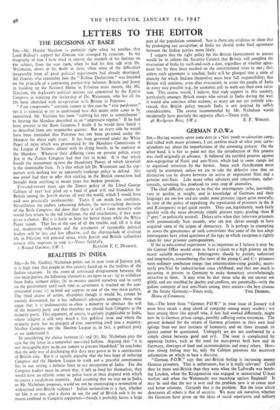LETTERS TO THE EDITOR
THE DECISIONS AT BASLE
StR,—Mr. Harold Nicolson is perfectly right when he testifies that Lord Balfour's support for Zionism was untinged by cynicism. In my biography of him I have tried to convey the warmth of his feelings on the subject, from the year 1906, when he had his first talk with Dr. Weizmann, down to his death in 193o, when some of the difficulties inseparable from all great political experiments had already developed. All Zionists who remember how the " Balfour Declaration " was founded on the principle of a continuing partnership between Britain and Jewry in building up the National Home in Palestine must mourn, like Mr. Nicolson, the deplorable political mistake just committed by the Zionist Congress in rejecting the leadership of Dr. Weizmann, who has all tis life been identified with co-operation with Britain in Palestine.
" Tour comprendre " certainly cannot in this case be " tout pardonner," yet it is essential to try to understand how this major error came to be committed. Mr. Nicolson has been " rubbing his eyes in astonishment " at hearing the Mandate described as an " oppressive regime." If he had been present at the Basle Congress I doubt if he would have heard it so described from any responsibie quarter. But on every side he would have been reminded that Palestine has not been governed under the Mandate for about eight years. It has been governed under the White Paper of 1939, which was pronounced by the Mandates Commission of the League of Nations, almost with its dying breath, to be contrary to the Mandate. Whatever their differing views on present policy, every Jew at the Zionist Congress had that fact in mind. It is that which breeds the resentment against the Mandatory Power, of which terrorism is the abominable fruit. It is that which left Dr. Weizmann and his sup- porters with nothing but an apparently bankrupt policy to defend. Not one proof had they to offer that sticking to the British connection had brought them anything in recent years but broken promises.
Five-and-twenty years ago the Zionist policy of the Lloyd George Cabinet of 1917 had piled up a fund of good will and friendship for Britain among the Jewish masses all over the world, which I would have said was practically inexhaustible. Today I am much less confident. Nevertheless the endless exhausting debates, the nerve-racking decisions of the Basle Congress, did show that there is still a large minority who would fain return to the old traditions, the old attachments, if they were given a chance. But it is futile to hope for better things while the White Paper stands. That lies at the root of all the trouble, and, till it is dug out, moderating influences and the arguments of reasonable political leaders will be less and less effective, and the degringolade of civilised life in Palestine will proceed apace, while Jewish and British authorities remain alike impotent to stop it.—Yours faithfully,


































 Previous page
Previous page